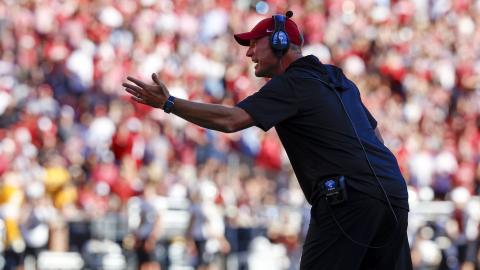
Kalen DeBoer Pushes Back on Crimson Tide Legacy: Defending His Alabama Players Against Saban’s “Unwarranted” Accusations
In a recent turn of events that has Alabama football fans talking, Washington Huskies head coach Kalen DeBoer has come to the defense of several of his former Crimson Tide players, clashing publicly with legendary Alabama head coach Nick Saban. As Saban openly criticized the current roster and questioned the commitment of recent players, DeBoer’s rebuttal has stirred controversy. By addressing what he claims are “unwarranted accusations,” DeBoer has inserted himself directly into the Alabama football legacy—a move that has divided fans, analysts, and alumni.
Saban’s Critique and the Fallout
During a press conference earlier this season, Saban made a rare but harsh critique of Alabama’s recent players, suggesting that a growing number have fallen short of the discipline, dedication, and mental toughness required to maintain Alabama’s dominance in college football. In particular, he appeared to reference former players who transferred out or failed to meet expectations, implying they weren’t “all-in” on the program’s vision.
While Saban didn’t name names, his comments implicitly cast a shadow over several players who had gone on to play for DeBoer at Washington. As a former Alabama assistant coach and now the successful leader of a top-10 program, DeBoer wasn’t about to let these remarks go unchallenged.
DeBoer’s Fiery Defense
DeBoer’s response came swiftly—and shockingly, given the near-sacred reputation Saban holds in college football circles. In a recent interview, DeBoer made it clear that he took Saban’s remarks personally, both as a coach and as someone invested in his players’ success. He defended his former Alabama athletes, arguing that the accusations reflected more about a lack of flexibility within Alabama’s program than any character flaw on the part of the players.
“When you question a player’s commitment, it’s like questioning their integrity,” DeBoer stated. “Some of these young men sacrificed their hearts and souls for Alabama and simply needed a fresh start. It’s unfair to reduce their stories to being ‘not good enough.’” DeBoer’s comments didn’t stop there; he suggested that Alabama’s rigid system might be driving players away and limiting their potential, a statement that casts a harsh light on the Crimson Tide’s culture.
A Question of Loyalty—or Changing College Football Norms?
While DeBoer’s words may seem like a brazen challenge to Saban, they also reflect a broader debate within college football today. With the rise of the transfer portal, athletes are now freer than ever to move between programs, find new environments, and seek playing time or coaching styles that fit their goals. Where Saban sees disloyalty, DeBoer sees players taking charge of their futures.
Some are calling this the future of college football: players who prioritize their personal development over sticking to a single program. DeBoer seems to understand this shift, while Saban’s comments suggest he’s not as eager to adapt to it. “At Washington, we believe in empowering players to take control of their destiny,” DeBoer said. “If that means they find a better fit with us after leaving somewhere else, we’re going to welcome them.”
Dividing Fans and Alumni
DeBoer’s defense of his players has split Alabama fans and alumni. Some view his statements as disloyal to a program that gave him his start. After all, it’s not every day that a former assistant coach goes on record disagreeing with one of the most successful coaches in college football history. Others, however, see DeBoer’s comments as a refreshing acknowledgment of the new realities players face in today’s NCAA landscape.
“DeBoer is standing up for his players, and that’s exactly what we need more of in college sports,” said one Washington fan. “Players aren’t just assets for the brand. They’re individuals who deserve the chance to find success, even if it’s not at their first school.”
Yet, Saban’s defenders argue that his tough-love approach is what has turned Alabama into a powerhouse and that DeBoer’s approach reflects a “softening” of values that won’t yield long-term success. “Saban is old-school, and that’s why he wins,” one Alabama fan commented on social media. “He’s pushing players to a higher standard, not coddling them.”
The Larger Impact on Recruiting and Coaching
This dispute between DeBoer and Saban could signal a deeper philosophical rift in coaching styles, one that may impact recruiting and program strategies in the years to come. Recruits and their families now face a choice between old-school powerhouse programs that demand unwavering loyalty and more progressive environments that promise flexibility and individual growth.
For DeBoer, standing by his players could help make Washington a top destination for recruits looking for a supportive, player-centric program. But it’s a gamble: challenging a figure like Saban risks alienating potential recruits who still view Alabama as the ultimate college football dream. Time will tell whether DeBoer’s player-focused approach can challenge Saban’s ironclad legacy, or if he’ll be another coach who briefly defied “the process” only to see Alabama continue its dominance.
A New Era—or a Flash in the Pan?
The question now remains: is DeBoer the vanguard of a new generation of coaches who prioritize flexibility and individuality, or will Saban’s time-tested, results-focused model continue to reign supreme? For college football fans, this clash of ideologies between DeBoer and Saban is more than just a spat; it’s a glimpse into what the future of college football might look like.
DeBoer’s remarks have sparked debate about loyalty, tradition, and change. But regardless of which side fans fall on, it’s clear that Kalen DeBoer isn’t backing down—and that’s a stance that could forever alter his legacy, whether for better or worse.




